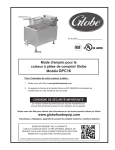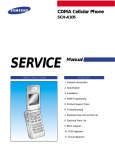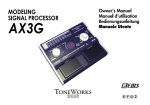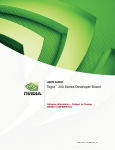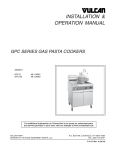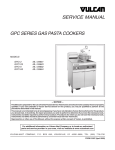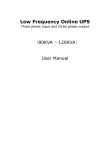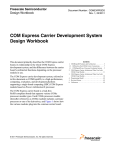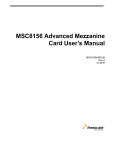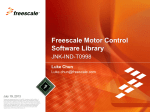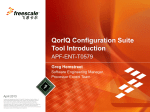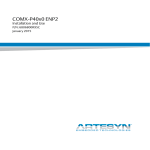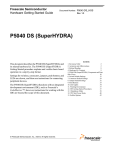Download QorIQ Qonverge BSC9131 Reference Design Board
Transcript
QorIQ Qonverge BSC9131 Reference Design Board Reference Manual Document Number: BSC9131RDBRM Rev 0, 06/2014 QorIQ Qonverge BSC9131 Reference Design Board Reference Manual, Rev. 0, 06/2014 2 Freescale Semiconductor, Inc. Contents Section number Title Page Chapter 1 Introduction 1.1 Related documentation....................................................................................................................................................7 1.2 Acronyms and abbreviations...........................................................................................................................................8 1.3 Bit and Byte definitions.................................................................................................................................................. 10 1.4 BSC9131RDB board features......................................................................................................................................... 11 1.5 BSC9131RDB board specifications................................................................................................................................11 1.6 BSC9131 processor features........................................................................................................................................... 13 Chapter 2 Power Supply 2.1 Primary power supply..................................................................................................................................................... 18 2.2 BSC9131RDB power supply structure........................................................................................................................... 19 Chapter 3 Working environment 3.1 Hardware kit contents..................................................................................................................................................... 21 3.2 Switch default settings.................................................................................................................................................... 22 3.3 Jumper default settings................................................................................................................................................... 29 3.4 Connector default settings...............................................................................................................................................32 3.5 Push buttons.................................................................................................................................................................... 35 3.6 LED lights.......................................................................................................................................................................36 3.7 Getting started.................................................................................................................................................................37 Chapter 4 Functional Description 4.1 Clocking..........................................................................................................................................................................41 4.2 Platform speed (CCB) clock........................................................................................................................................... 42 4.3 Core clock ...................................................................................................................................................................... 43 4.4 DSP clock........................................................................................................................................................................43 4.5 DDR clock...................................................................................................................................................................... 44 QorIQ Qonverge BSC9131 Reference Design Board Reference Manual, Rev. 0, 06/2014 Freescale Semiconductor, Inc. 3 Section number Title Page 4.6 I2C...................................................................................................................................................................................46 4.7 uSIM interface................................................................................................................................................................ 47 4.8 TDM interface (SLIC/SLAC)......................................................................................................................................... 48 4.9 GPS module.................................................................................................................................................................... 49 4.10 BSC9131RDB USB........................................................................................................................................................ 49 4.11 Ethernet 1588 clock........................................................................................................................................................ 50 4.12 Antenna interface............................................................................................................................................................ 52 4.13 Maxim PHY.................................................................................................................................................................... 52 4.14 ADI................................................................................................................................................................................. 52 4.15 Reset and initialization....................................................................................................................................................53 4.16 Power-On-Reset sequence.............................................................................................................................................. 57 4.17 JTAG COP, JTAG/EOnCE, and UART......................................................................................................................... 57 4.18 Ethernet........................................................................................................................................................................... 59 4.19 SPI...................................................................................................................................................................................61 QorIQ Qonverge BSC9131 Reference Design Board Reference Manual, Rev. 0, 06/2014 4 Freescale Semiconductor, Inc. Chapter 1 Introduction BSC9131 Reference Design Board (RDB) is an application development system that verifies the QorIQ Qonverge BSC9131 processor device operations and provides a high level of system performance characterization. BSC9131RDB reflects the design-focus of most customer applications such as electric, circuit, and logic testing. BSC9131RDB enables the simultaneous operations and verification of interfaces and protocols found in specific market applications. BSC9131 is a highly integrated device that targets evolving Microcell, Picocell, and Enterprise-Femto base station market sub-segments. The BSC9131 device combines Power Architecture® e500 and DSP StarCore SC3850 core technologies with MAPLEB2F baseband acceleration processing elements. Together they address the need for a high performance, low cost, and integrated solution that handles all the required processing layers without the need of an external device (except for an RF transceiver or, in a Micro base station configuration, a host device that handles the L3/L4 and handover between sectors). The BSC9131RDB board support package (BSP) is built using a Linux operating system. Developers using BSC9131RDB onboard resources and debugging devices can perform the following: • • • • Upload and run code Set breakpoints Display memory and registers Connect proprietary hardware for incorporation into a target system using BSC9131 as a processor • Use BSC9131RDB as a demonstration tool, that is, the developer application software is programmed into flash memory and run in exhibitions. A software application developed for the BSC9131 processor can run as a bare bones operation or with various input/output data streams; for example, GETH connections. Results can be analyzed using the CodeWarrior debugger or with other methods that directly analyze I/O data streams. QorIQ Qonverge BSC9131 Reference Design Board Reference Manual, Rev. 0, 06/2014 Freescale Semiconductor, Inc. 5 Figure 1-1 shows the component side of the BSC9131RDB board. Figure 1-1. BSC9131RDB board: Component side QorIQ Qonverge BSC9131 Reference Design Board Reference Manual, Rev. 0, 06/2014 6 Freescale Semiconductor, Inc. Chapter 1 Introduction Figure 1-2. BSC9131RDB board: Print side 1.1 Related documentation The BSC9131RDB Quick Start Guide (QS) is required reading. A media copy is included in the Hardware Getting Started kit. The table below lists and explains the additional documents that you can refer to, for more information about BSC9131RDB. QorIQ Qonverge BSC9131 Reference Design Board Reference Manual, Rev. 0, 06/2014 Freescale Semiconductor, Inc. 7 Acronyms and abbreviations Some of the documents listed below may be available only under a non-disclosure agreement (NDA). To request access to these documents, contact your local field applications engineer or sales representative. Table 1-1. Related documentation Document Description BSC9131 QorIQ Qonverge Multicore Baseband Processor Data sheet Provides information about Pin assignments, Electrical, characteristics, Hardware design, considerations, Package information, and Ordering information. BSC9131 QorIQ Qonverge Multicore Baseband Processor Reference Manual Provides a detailed description about BSC9131 QorIQ Qonverge multicore processor, and features, such as memory map, serial interfaces, power supply, chip features, and clock information. 1.2 Acronyms and abbreviations The table below lists and explains the acronyms used in this document. Table 1-2. Acronyms and abbreviations Term Description ADI Analog Device Interface ADM Address Data MUX AGC Antennas Gain Command AIC Antenna Interface Controller ANT Antenna CFG Configuration CLK Clock CLKIN Clock Input; interchangeable with SYSCLK CON Connector COP Common On-Chip Processor CPU Central Processing Unit CRC Cyclical Redundancy Checking CS Chip Select CTS Clear To Send DDR Double Data Rate DIP Dual-in-Line Package (switches) DMA Directy Memory Access DPU Debug and Profiling Unit DSP Data Signal Processing dTSEC Data 3-speed Ethernet Controller DUART Dual Universal Asynchronous Receiver/Transmitter Table continues on the next page... QorIQ Qonverge BSC9131 Reference Design Board Reference Manual, Rev. 0, 06/2014 8 Freescale Semiconductor, Inc. Chapter 1 Introduction Table 1-2. Acronyms and abbreviations (continued) Term Description DUT Device-under-Test ECC Error Detection and Correction EEPROM Electrical Erasable Programmable Memory EOnCE Enhanced On Chip Emulator EPIC Enhanced Programmable Interrupt Controller eSDHC Enhanced Secure Digital Host Controller eSPI Enhanced Serial Peripheral Interface ETH Ethernet eTSEC Enhanced 3-speed Ethernet Controller FDD Frequency-division Duplexing FPGA Field-Programmable Gate Array GETH Giga Ethernet GPIO General Purpose In/Out GPS Global Positioning System GSM Global System for Mobile Communications HRESET Hard Reset I2C Inter-Integrated Circuit Multi-master Serial Computer Bus IDE Integrated Development Environment IFC Integrated Flash Memory Controller IO Input/Output JTAG Joint Test Access Group (IEEE® Std. 1149.1™) LED (also LD & D) Light-emitting Diode LSB Least Significant Bit LTE Long Term Evolution MAPLE Multi Accelerator Platform Engine MISO Multiple Input, Single Output MMU Memory Management Unit MSB Most Significant Bit MUX Multiplex OTG On-the-Go Protocol PD Presence Detect PEX PCI Express (PCIe) PHY Physical Layer PIC Programmable Interrupt Controller PLAT Platform PLL Phased Lock Loop PORESET Power-on-Reset POVDD Parameter Operating Voltage PS Power Supply Table continues on the next page... QorIQ Qonverge BSC9131 Reference Design Board Reference Manual, Rev. 0, 06/2014 Freescale Semiconductor, Inc. 9 Bit and Byte definitions Table 1-2. Acronyms and abbreviations (continued) Term Description RC Root Complex RCW Reset Configuration Word RDB Reference Design Board RF Radio Frequency RGMII Reduced General Media Independent Interface ROM Read-only Memory RTC Real Time Clock SD Secure Digital SerDes or SRDS Serializer/Deserializer High Speed Serial Communication Lines; e.g. PEX SIM Subscriber Identity Module SLAC Subscriber Line Audio Processing Circuit SLIC Subscriber Line Interface Circuit SPI Serial Peripheral Interface SYS System SYSCLK System Clock; interchangeable with CLKIN TDD Time Division Duplex TDM Time-division multiplexing UART Universal Asynchronous Receiver/Transmitter UMTS Universal Mobile Telecommunications System USB Universal Serial Bus uSIM UMTS Subscriber Identity Module VCC Voltage at various common power supply terminals WCDMA Wideband Code-Division Multiple Access XVDD Phased Lock Loop Voltage 1.3 Bit and Byte definitions Table 1-3. Bit and Byte terminology Bit Byte Binary digit with a single binary value, 1 or 0. A unit of data, eight binary units long that is used as a measure of computer processor storage and real and virtual Commonly used for measuring the amount of data transferred memory. in one second between two telecommunication points. Kbps = Kbit/s Kilobit per second (1 Kbps = 1000 bits) Kbyte = KB = KByte 1 Kilobyte = 1024 bytes Mbps = Mbit/s Megabit per second (1 Mbps = 1,000,000 bits) Mbyte = MB = MByte 1 Megabyte = ~ 1,000,000 bytes Gbps = Gbit/s Gigabit per second (1 Gbps = Gbyte = GB = GByte "billions of bits") 1 Gigabyte = ~ 1 billion bytes QorIQ Qonverge BSC9131 Reference Design Board Reference Manual, Rev. 0, 06/2014 10 Freescale Semiconductor, Inc. Chapter 1 Introduction 1.4 BSC9131RDB board features The BSC9131RDB supports a BSC9131 processor. The board has a 1.0V core voltage and runs at 800/1000 MHz for each core. The 1.5V DDR runs at a 400/500MHz clock rate. Figure 1-3 shows the BSC9131RDB block diagram. 1.5 BSC9131RDB board specifications The following table list the various features of BSC9131RDB board. Table 1-4. BSC9131RDB features BSC9131RDB feature Specification Description Processor BSC9131 Internal clock runs at 800/1000 MHz @ 1.0V core voltage Memory DDR3 and Bus • 8-bit, 1GB, 32-bit, 78-ball FPGA, DDR3 devices (4) • Device data rate up to 800 Mbp/s IFC Interface Buffered Memory: NAND flash • 8-bit port size in socket • 128 MB small page • 3.3V ANT1 and ANT2 ADI1 ADI2 and MAX RF Connector2 ANT3 ADI3 RF Connector1 GETH Transceiver dTSEC RCW I2C controlled DIP-switches or IO Expander DUART UART0 DUART UART1 I2C I2C0 • • • • • • USB OTG and PHY • USB OTG (microAB connector) • PHY - USB SMSC3315 eSPI1 SPI • Spansion SPI FLASH CS0 • Control RF Card2 CS3 • SLIC/SLAC Le88266DLC CS1 eSPI2 SPI • Control RF Card1 CS0, CS1 • Control RF Card2 CS2, CS3 • dTSEC1 - RGMII VCS8641XKO • dTSEC2 - RGMII VCS8641XKO Onboard DIP-switches • Dedicated D-type RS232 connector • Muxed with EOnCE pins GPS LEA-6T-0 module transfer data 256 KB boot EEPROM External connector for external host IO expander for RCW Thermal monitor GPS LEA-6T-0 module control Control RF cards 1 and 2 Table continues on the next page... QorIQ Qonverge BSC9131 Reference Design Board Reference Manual, Rev. 0, 06/2014 Freescale Semiconductor, Inc. 11 BSC9131RDB board specifications Table 1-4. BSC9131RDB features (continued) BSC9131RDB feature Specification Description JTAG EOnCE JTAG COP Onboard COP header JTAG_MODE JTAG_MODE Device controlled through COP or EOnCE or a combination thereof 1588 1588 Support 1588 optional input CLK 66 MHz/ 100 MHz/GPS10 MHz/ANT Ref CLK SIM CARD SIM CARD SIM CARD 1.8V/3.3V SYS_CLK/RTC_CLK/DSP_in_CLK/ DDRCLK 66MHz/100MHz selectable clock SYS_CLK/RTC_CLK/DSP_in_CLK/ DDRCLK Power Up Power-ON • Remote Power-ON used HRESET_REQ REG • Power-ON switch • HRESET switch Power Requirements Standalone • Independent host; PEX RC • 12V @ 5.5A external DC PS Power Consumption Cores and Platform Max. 5W at 1000MHz @VDD=1.0V Supply Voltages Cores Max. 5W at 1000MHz@VDD=1.0V Core, DDR, DSP, PLAT, RF - PLLs 1.0 V Ethernet LVDD 2.5V; subject to protocol Local bus BVDD 3.3 DDR3 GVDD 1.5V Secure Fuse Programming Overdrive POVDD 1.5V USB, SPI1, CVDD 3.3V ADI Interface SPI2 - XVDD 1.8V/3.3V MAX Interface - RVDD 1.5V Environmental Conditions Operating Temperature Operating Junction Temperature Dimensions • Onboard EOnCE header • Muxed with UART0 pins 0OC to 70OC (Tj)1 0OC to 105° C Storage Temperature -25OC to 85OC Relative Humidity 5% to 90% (non-condensing) Length 170 mm Width 170 mm 1. Processor technology QorIQ Qonverge BSC9131 Reference Design Board Reference Manual, Rev. 0, 06/2014 12 Freescale Semiconductor, Inc. Chapter 1 Introduction 5V_RF XVDD VCC3.3V ANT1 ADD 0x51 CS3 CS2 CS3 RF Card2 CS0 CS1 RF Card1 ANT2 SPANSION SPI FLASH CS0 AVDD-CORE/DDR/DSP/ PLAT/RF SPI2 1588_CLK_IN 1588CLK GPS10MHZ CLK GPS_1PPS_OUTPUT Thermal monitor UART1 USB PHY USB3315 128M x8 Bit NAND Flash Memory 25 Mhz CLK USB Interface 2G DDR3 1.5V 2G DDR3 1.5V MT41J256M8HX-15E IT:D 2G DDR3 1.5V MT41J256M8HX-15E IT:D 2G DDR3 1.5VIT:D MT41J256M8HX-15E MT41J256M8HX-15E IT:D SPI1_CS1 RGMII PHY RGMII2 Level translator 3.3/1.8V Le88266DLC SLIC/SLAC 2.048Mhz CLK I2C IOExpander Power Up Reset COP connector UART0/ EONCE EONCE connector UART Transceiver 9PIN D Type connector 66Mhz CLK DSP_CLK 100Mhz CLK DDR_CLK BSC9131 DDR SPD HRESET SYS_CLK SIM Interface 5V to 2.5V RJ11 connector Config signals COP RGMII1 5V to 1.5V/3.3V Select 3.3V/1.5V IFC VSC8641XKO RGMII PHY VSC8641XKO SIM CARD 5V to DDR 1.5V I2C0 I2C ADDRESS 0X42 GPS-LEA-6T-0 5V to 3.3V I2C External connector I2C0 12V Input connector Regulator DIP SWITCH Micro USB CONN 1588_TRIG_IN SPI1 BUS TDM SPI1 12V to 5V 12V to 5V Regulator 5V to 1.5V DDR Boot seq GPS ANTENNA 5V to CORE regulator VDD/VDDC MAX RVDD/POVDD1 ADI_CLK BVDD/CVDD GVDD MAX_CLK XVDD ANT3 LVDD ADD 0x53 5V to 3.3V/ 1.8V RTC_CLK 1588CLK Figure 1-3. BSC9131RDB board block diagram 1.6 BSC9131 processor features The BSC9131 SoC has the following features and specifications: Table 1-5. BSC9131 processor features Feature Power Architecture Specification e500 Processor e500 Core Subsystem Description 256 KB shared L2 cache • 32KB L1 instruction cache (ICache) • 32KB L1 data cache (DCache) • 512 KB L2 cache/L2 memory/L2 stash • PIC • Debug support • Timers Table continues on the next page... QorIQ Qonverge BSC9131 Reference Design Board Reference Manual, Rev. 0, 06/2014 Freescale Semiconductor, Inc. 13 BSC9131 processor features Table 1-5. BSC9131 processor features (continued) Feature StarCore Specification SC3850 DSP Processor Description 512KB private L2 cache SC3850 DSP Subsystem • 32 KB 8-way L1 ICache • 32 KB 8-way L1 DCache • 256 KB 8-way L2 unified I/DCache (M2 memory) • MMU • EPIC • DPU • Two 32-bit timers MAPLE Femto Base Station Baseband Processing (MAPLE-B2F) • Multi-standard baseband algorithm accelerator for channel decoding/ encoding, Fourier transforms, UMTS chip rate processing, LTE UP/DL channel processing, and CRC algorithms • Accelerators for convolution, filtering, turbo encoding/decoding, Viterbi decoding, chip rate processing, and matrix inversion operations Security Engine - • Dedicated • Trusted boot Interfaces DDR3/3L Memory Interface • 32-bit data width without ECC • 16-bit with ECC • Up to 400 MHz clock/800 MHz data rate DMA Controller OCN DMA with four bi-directional channels Gigabit Ethernet Controllers (2) • 3-speed • Network acceleration including IEEE 1588™ v2 hardware support and virtualization (eTSEC) • eTSEC 1 supports RGMII/RMII • eTSEC 2 supports RGMII USB 2.0 • High speed • Host and device controller with ULPI interface eSDHC - AIC Supports the following: • 3 industry standard JESD207 • 3 custom ADI RF interfaces (two dual port and one single port) • 3 MAXIM MaxPHY serial interfaces ADI lanes support the following: • full duplex FDD support • half duplex TDD support USIM Facilitates the communication to SIM cards or Eurochip pre-paid phone cards Table continues on the next page... QorIQ Qonverge BSC9131 Reference Design Board Reference Manual, Rev. 0, 06/2014 14 Freescale Semiconductor, Inc. Chapter 1 Introduction Table 1-5. BSC9131 processor features (continued) Feature Specification Description TDM • One port • 256 channels DUART Two controllers eSPI Four controllers I2C Two controllers IFC - GPIO Sixteen 32-bit timers Figure 1-4 shows BSC9131 processor block diagram. x4 StarCore SC3850 DSP core Power Architecture e500 core 32-Kbyte 32-Kbyte L1 D-cache L1 I-cache 32-Kbyte 32-Kbyte L1 D-cache L1 I-cache 521-Kbyte L2 cache Coherency 256-Kbyte L2 cache module 32-bit DDR3/3L memory controller MAPLE-B2F baseband accelerator LTE/UMTS/WiMAX RF interface: parallel & serial (maxPHY) Multicore fabric 4x eSPI 2x I2C GPIO Ethernet DMA Security engine 4.4 USB 2.0 Secure boot 2x DUART IEEE 1588TM 1GE USIM RMII/ RGMII IFC 1GE RGMII eSDHC 2x PWM BSC9131 TDM Clocks/reset Figure 1-4. BSC9131 processor block diagram QorIQ Qonverge BSC9131 Reference Design Board Reference Manual, Rev. 0, 06/2014 Freescale Semiconductor, Inc. 15 BSC9131 processor features QorIQ Qonverge BSC9131 Reference Design Board Reference Manual, Rev. 0, 06/2014 16 Freescale Semiconductor, Inc. Chapter 2 Power Supply The BSC9131RDB power distribution system (PDS) provides the voltage necessary to operate the BSC9131 chip and peripheral board devices. Figure 2-1 shows the voltage rail connections with BSC9131 power supply requirements. Figure 2-2 shows the DUT power sequence. QorIQ Qonverge BSC9131 Reference Design Board Reference Manual, Rev. 0, 06/2014 Freescale Semiconductor, Inc. 17 Primary power supply U93 BSC9131 12V 5.5A Input DUT_LVDD LVDD OVDD/ CVDD/ BVDD CINCON ELECTRONICS [TR70A1211E11] VCC_3_3 U50 DUT_GVDD 12V to 5V GVDD DUT_POVDD POVDD RVDD VDDC/VDD U1 5V to 3.3V/1.8V 5V to 3.3V OUT 3.3V - 3A AD - ADP2118 EN DUT_XVDD1_SEL 1'b0-3.3 V 1'b1-1.8 V RF_CON 1 OUT 3.3V/1.8V - 3A AD - ADP2118 U90 SW6[1] DUT_XVDD VCC_3_3 VCC_5RF U89 DUT_LVDD DUT_XVDD1_SEL OUT 5V - 6A TI - PTH12050WAZ DUT_XVDD VCC_3_3 DUT_XVDD XVDD 12V to 5V Remote ON/OFF OUT 5V - 6A TI - PTH12050WAZ DUT_RVDD DUT_VDD VCC_5RF U49 VCC_5 5V to 2.5V OUT 2.5V - 3A EN AD - ADP2118 J28 select 3.3/1.8V open = 1.8V Close = 3.3V RF_CON 2 DUT_GVDD VTT_DDR VREF_DDR U35 5V to DDR3 Power Freescale MC34716EP EN DUT_POVDD DUT_RVDD U41 5V to 1.5V Linear EN LTC3025 DUT_VDD U91 5V to 1V Linear LTC3616 - 6A EN PG Power up reset Figure 2-1. DUT power supply block diagram VDDC/VDD XVDD RVDD POVDD GVDD OVDD/CVDD/BVDD LVDD Figure 2-2. DUT power sequence QorIQ Qonverge BSC9131 Reference Design Board Reference Manual, Rev. 0, 06/2014 18 Freescale Semiconductor, Inc. Chapter 2 Power Supply 2.1 Primary power supply The standalone BSC9131RDB 66W power supply has a standard CE/UL-approved 12V/ 5.5A. 2.2 BSC9131RDB power supply structure The main BSC9131RDB power voltages are as follows: Table 2-1. BSC9131RDB power voltages Part location Vendor Part number Function Voltage U1 Analog Devices ADP2118 Peripherals 3.3 U35 Freescale Semiconductor MC34716EP DDR 1.5 U41 Linear LTC3025 POVDD 1.5 U49 Texas Instruments PTH12050WAZ VCC_5RF 5.0 U50 Texas Instruments PTH12050WAZ VCC_5 5.0 U89 Analog Devices ADP2118 XVDD 3.3/1.8 selected by J28. U90 Analog Devices ADP2118 eTSEC and Ethernet PHY 2.5 U91 Linear LTC3616 Core/Platform 1.0 QorIQ Qonverge BSC9131 Reference Design Board Reference Manual, Rev. 0, 06/2014 Freescale Semiconductor, Inc. 19 BSC9131RDB power supply structure QorIQ Qonverge BSC9131 Reference Design Board Reference Manual, Rev. 0, 06/2014 20 Freescale Semiconductor, Inc. Chapter 3 Working environment The BSC9131RDB has a standalone working environment, powered by an external 12V PS (included in kit) through connector P4. 3.1 Hardware kit contents This section lists hardware kit contents of the BSC9131RDB board. Table 3-1. BSC9131RDB hardware kit inventory Hardware kit inventory 1. BSC9131RDB board (1) 1 2. Ethernet Cable (1) 3. Telephone RJ11 Cable (1) 4. Antenna Active GPS (1) QorIQ Qonverge BSC9131 Reference Design Board Reference Manual, Rev. 0, 06/2014 Freescale Semiconductor, Inc. 21 Switch default settings Table 3-1. BSC9131RDB hardware kit inventory Hardware kit inventory 5. 15cm u-USBA MALE to USBA FEMALE cable (1) 6. RS 232 SERIAL, DB9 MALE to USB A MALE cable (1) 7. RF Spacer Parts • Spacer 16mm (8) • Screws (16) 8. Power Supply (1) 9. Power Cord 10. Universal AC Plug Adaptor The printed matter (not included in the above table) includes: • • • • QorIQ Qonverge BSC9131 Reference Design Board Quick Start Guide Freescale Warranty Card: 920-75133 Safety Notice: 926-75254 Contact Information Sheet: 920-90570-00 QorIQ Qonverge BSC9131 Reference Design Board Reference Manual, Rev. 0, 06/2014 22 Freescale Semiconductor, Inc. Chapter 3 Working environment 3.2 Switch default settings Table 3-2 shows the default DIP-switch positions to establish the BSC9131RDB clock domains. The default settings are for general use. If using a board support package (BSP), then refer to the BSP document. NOTE Ensure DIP-switches are set according to the default values. Table 3-2. BSC9131RDB clock domains Clock Domain Schematic Net Test Point Expected Value Remarks SYS CLK DUT_SYSCLK DUT_SYSCLK U45.4 66.66 MHz J16 selects 66.66 or 100MHz. DUT DDR CLK PLL DDRCLK U46.4 66.66 MHz J12 selects 66.66 or 100MHz. RTC CLK PLL RTCCLK U44.4 66.66 MHz J16 selects 66.66 or 100MHz. DSP_CLK DSPCLK U47.4 66.66 MHz J17 selects 66.66 or 100MHz. 1588_CLK 1588_SYSCLK U43.4 66.66 MHz J16 selects 66.66 or 100MHz. GPS_10MHz_CLK U101.10 - 10MHz from GPS module. CON2_XCVR_REF U101.8 - Clock rate from RF card J6. CON1_XCVR_REF U101.4 - Clock rate from RF card J9. Figure 3-1 shows BSC9131RDB DIP-switch locations. QorIQ Qonverge BSC9131 Reference Design Board Reference Manual, Rev. 0, 06/2014 Freescale Semiconductor, Inc. 23 Switch default settings Figure 3-1. BSC9131RDB DIP-switch locations Table 3-3 explains BSC9131RDB switch settings. NOTE User can choose the switch configuration values between 66.66 and 100 MHz. Table 3-3. BSC9131RDB switch configurations Switch Options Recommendations SW1 SYS_PLL[0:2]: CCB Clock PLL Ratio 3'b000 4:1 - 3'b001 5:1 If 100MHz clock select (CS) then CCB = 500MHz 3'b010 6:1 If 66.66MHz CS then CCB = 400MHz [Default] 3'b011 8:1 Reserved 3'b100 10:1 Reserved 3'b101 12:1 Reserved 3'b110 PLL Bypass Functional Mode; Reserved 3'b111 PLL Bypass Burn-in Mode; Reserved Table continues on the next page... QorIQ Qonverge BSC9131 Reference Design Board Reference Manual, Rev. 0, 06/2014 24 Freescale Semiconductor, Inc. Chapter 3 Working environment Table 3-3. BSC9131RDB switch configurations (continued) Switch Options Recommendations DDR_PLL[0:1]: DDR Complex Clock PLL Ratio 2'b00 8:1 If 100MHz CS then DDR block clock = 800MHz (DDR clock = 400MHz) 2'b01 10:1 - 2'b10 12:1 If 66.66MHz CS then data rate = 800MHz (DDR clock = 400MHz) [Default] 2'b11 Synchronous Mode Reserved DDR_SPEED0: DDR Complex Speed0 DDR_SPEED0 - '0' PA If 100MHz CS then DDR data rate < 967MHz [Default] DDR_SPEED0 - '1' PA DDR data rate > / = 967MHz DDR_SPEED1: DDR Complex Speed1 DDR_SPEED1 '0' [Default] If one of the following is chosen then DDR1 should be 0: • cfg_ddr_pll = 8 • cfg_ddr_pll = 10 • cfg_ddr_pll = 12 DDR_SPEED1 '1' If cfg_ddr_pll = 12 is chosen then DDR1 = 1 FLASH_MODE: NAND FLASH Mode 1'b0 Bad block indicator is found, • on page 0; and, • on last page of each block 1'b1 Bad block indicator is found, • on page 0; and, • on page 1 of each block SW2 BOOT_SEQ[0:1] 2'b00 Reserved 2'b01 • Uses normal I2C addressing mode • Boot sequencer is enabled and loads configuration information from a ROM on the I2C1 interface • Valid ROM must be present 2'b10 • Uses extended I2C addressing mode • Boot sequencer is enabled and loads configuration information from a ROM on the I2C1 interface • Valid ROM must be present 2'b11 • Boot sequencer is disabled • No I2C ROM is accessed [Default] PLATE_SPEED: Platform Speed 1'b0 Platform clock frequency > / = 167MHz and < 320 MHz 1'b1 Platform clock frequency > / = to 320MHz and< 601MHz [Default] Table continues on the next page... QorIQ Qonverge BSC9131 Reference Design Board Reference Manual, Rev. 0, 06/2014 Freescale Semiconductor, Inc. 25 Switch default settings Table 3-3. BSC9131RDB switch configurations (continued) Switch Options Recommendations SYS_SPEED: System Speed 1'b0 SYSCLK frequency is > 33MHz and < / = 65MHz 1'b1 SYSCLK frequency is > 65MHz and < / = 133MHz [Default] IFC_PB[0:2]: IFC Pages Per Block Configuration 3'b000 Reserved 3'b001 2K pages per block 3'b010 1K pages per block 3'b011 512-bit pages per block 3'b100 256-bit pages per block 3'b101 128-bit pages per block 3'b110 64-bit pages per block 3'b111 32 bit pages per block [Default] IFC_ADM_MODE: IFC Address Shift Mode Configuration for (NOR FLASH Only) 1'b0 Lower order address bits are MUXed with data on IFC_AD[0:15] 1'b1 Higher order address bits are MUXed with data on IFC_AD[0:15] [Default] SW3 CORE_PLL[0:2]: e500 Core PLL Ratios 3'b000 Reserved 3'b001 Reserved 3'b010 1:1 3'b011 3:2 3'b100 • 2:1 • Core frequency 800MHz = 400 x 2 for 66.66MHz CS 3'b101 • 5:2 • Core frequency 1GHz = 400 x 5/2 for 66.66MHz CS [Default] 3'b110 3:1 3'b111 Reserved CORE_SPEED: e500 Core Speed 1'b0 Core clock frequency is > / = to 333MHz and < 500MHz 1'b1 Core clock frequency is > / = to 500MHz and < 1001MHz [Default] DDR PLL BACKUP [Default = 1] Reserved DDR H/F MODE [Default = 0] Reserved IFC_ECC[0:1] Table continues on the next page... QorIQ Qonverge BSC9131 Reference Design Board Reference Manual, Rev. 0, 06/2014 26 Freescale Semiconductor, Inc. Chapter 3 Working environment Table 3-3. BSC9131RDB switch configurations (continued) Switch Options Recommendations 2'b00, 2'b01 ECC disabled 2'b10 4-bit correction 2'b11 8-bit correction [Default] SW4 DSP_PLL[0:3]: DSP Subsystem PLL Configuration 4'b0000 [400MHz] Use COP platform frequency as CLKIN 4'b0001 • DSP_CLK = 66.66MHz • DSP core frequency =800MHz 4'b0010 • DSP_CLK = 100MHz • DSP core frequency = 800MHz 4'b0011 • DSP_CLK = 100MHz • DSP core frequency = 1000MHz [Default] 4'b0100, 4'b0101, 4'b0110, 4'b0111, 4'b1000, 4'b1001, 4'b1010, 4'b1011, 4'b1100, 4'b1101, 4'b1110 Reserved 4'b1111 • DSP_CLK = 66.66MHz • DSP core frequency = 1000MHz ROM_LOC[0:3]: Boot ROM Location 4'b0000, 4'b0001, 4'b0010, 4'b0011 Reserved 4'b0100 DDR controller1 4'b0101 Reserved 4'b0110 SPI 4'b0111 eSDHC (SD/MMC) 4'b1000 8-bit NAND-512-bit page size [Default] 4'b1001 8-bit NAND-2K page size 4'b1010 8-bit NAND-4K page size 4'b1011 RDB does not support 8-bit NOR 4'b1100 RDB does not support 16-bit NAND-512-bit page size 4'b1101 RDB does not support 16-bit NAND-2K page size 4'b1110 RDB does not support 16-bit NAND-4K page size 4'b1111 RDB does not support 16-bit NOR SW5 Table continues on the next page... QorIQ Qonverge BSC9131 Reference Design Board Reference Manual, Rev. 0, 06/2014 Freescale Semiconductor, Inc. 27 Switch default settings Table 3-3. BSC9131RDB switch configurations (continued) Switch Options Recommendations SVR[0:1] Not Used: Reserved ENG_USE1 Not Used: Reserved CPU_BOOT: CPU Boot Configuration 1'b0 • CPU boot hold-off mode. • e500 core is prevented from booting until configured by an external master 1'b1 e500 core is allowed to boot without waiting for configuration by an external master [Default] SRDS_RFCLK Not Used: Reserved IO_PORTS[0:1] Not Used: Reserved IFC_ADM_MODE_P1010 Not Used: Reserved SW62 DUT_XVDD1_SEL • I/O voltage status for XVDD1/2 supplies. • XVDD1/2 reflect the state of XVDDx_VSEL input pins 1'b0 • 3.3V • J28 should be short 1'b1 • 1.8V • J28 should be open [Default] BSC9131_RCW 1'b0 P1010 in socket 1'b1 BSC9131 in socket CFG_JTAG_MODE[0:1] - CFG_JTAG_MODE[0:1] =0 0 Uses IFC_WP_B and IFC_BCTL signals CFG_JTAG_MODE[0:1] =0 1 Uses IFC_WP_B and IFC_BCTL signals CFG_JTAG_MODE[0:1] =1 0 Uses IFC_WP_B and IFC_BCTL signals CFG_JTAG_MODE[:01] =1 1 Uses DSP_TDI, DSP_TDO and DSP_TRST signals [Default] DSP_EE0 1'b0 Normal operation [Default] 1'b1 Titanium debug request (DSP CORE STOP) CFG_SRDS_REFCLK Internal use only 1. Unsupported as a boot source in secure boot mode. 2. Refer Configuration JTAG modes table. Table 3-4 lists the configuration details of the JTAG Mode. Table 3-4. Configuration JTAG modes CFG_JTAG_MODE[0:1] 00 Power Architecture DSP Architecture JTAG Available JTAG Available Yes No JTAG Topology Access Power Architecture and DSP domains using Power Architecture JTAG port J3. Table continues on the next page... QorIQ Qonverge BSC9131 Reference Design Board Reference Manual, Rev. 0, 06/2014 28 Freescale Semiconductor, Inc. Chapter 3 Working environment Table 3-4. Configuration JTAG modes (continued) CFG_JTAG_MODE[0:1] Power Architecture DSP Architecture JTAG Available JTAG Available JTAG Topology 01 No Access DSP domain using Power Architecture JTAG port J3. 10 No Access Power Architecture domain using Power Architecture JTAG port J3. 11 Yes • Access Power Architecture domain using Power Architecture JTAG J3. • Access DSP domain using DSP JTAG J2. The following table shows different clock options and the corresponding DIP-switches setting. Table 3-5. Platform, PPC Core, DSP Core, and DDR SPEED for SYS_CLK 66.66MHz and 100MHz SYS_CLK 66.66MHz 100MHz 100MHz CCB (Platform) 400MHz SW1[1,2,3] = 0,1,0 400MHz SW1[1,2,3] = 0,0,0 500MHz SW1[1,2,3] = 0,0,1 PPC Core 800MHz SW3[1,2,3] = 1,0,0 800MHz SW3[1,2,3] = 1,0,0 1000MHz SW3[1,2,3] = 1,0,1 DSP Core 800MHz SW4[1,2,3,4] = 0,0,0,1 800MHz SW4[1,2,3,4] = 0,0,0,1 1000MHz SW4[1,2,3,4] = 0,0,1,1 DDR 800MHz SW1[4,5,6,7] = 1,0,0,1 800MHz SW1[4,5,6,7] = 1,0,0,1 800MHz SW1[4,5,6,7] = 0,0,0,0 3.3 Jumper default settings Table 3-6 lists the factory default 3-Pin jumper settings for the BSC9131RDB board. The default settings are for general use. If using a BSP, then refer to the BSP document. Table 3-6. BSC9131RDB 3-Pin jumper default settings Jumper Purpose Close State 1,2 Close State 2,3 Remarks J1 UART1_ CTS/COP_SRST/SIM_PD COP_SRST SIM_PD [Default] 1, 2 J5 RF Interface2 CNT2 Select ANT2_AGC to PIN33 ANT2_AGC to PIN90 [Default] 2, 3 J7 SPI1CS3/TCXO_PWM RF2_CON SPI1CS3 RF2_CON TCXO_PWM [Default] 1, 2 J8 SPI1_MISO/CKSTP_IN SPI1_MISO CKSTP_IN [Default] 1, 2 J10 RF Interface1 CNT2 Select ANT3_AGC to PIN33 ANT3_AGC to PIN90 [Default] 2, 3 Table continues on the next page... QorIQ Qonverge BSC9131 Reference Design Board Reference Manual, Rev. 0, 06/2014 Freescale Semiconductor, Inc. 29 Jumper default settings Table 3-6. BSC9131RDB 3-Pin jumper default settings (continued) Jumper J11 Purpose PO_VDD1 Close State 1,2 GND Close State 2,3 1.5V Remarks [Default] 2, 3 Table 3-7 lists the factory default 2-Pin jumper settings for the BSC9131RDB board. Table 3-7. BSC9131RDB 2-Pin jumper default settings Jumper Purpose Close State Open State 2,3 Remarks J12 DDR CLK 66MHz 100MHz [Default] Close J13 ADI/MAX_REF_CLK Input CLK from RF CON From RF CON1 From RF CON2 [Default] Close J16 SYS CLK, RTC_CLK, 1588_CLK 66MHz 100MHz [Default] Close J17 DSP_CLK 66MHz 100MHz [Default] Open J18, J21 1588_CLK_IN Source - J18 and J21 SourceCON1_XC VR_REF J21 J18 Source GPS_10MHz_CL K J18 J21 SourceCON2_XC VR_REF J18 and J21 - Source J16 J19 Boot Sequence EEPROM Write Protect Write Enable Write Protect [Default] Close J20 SIM POWER Supply 1.8V 3.3V [Default] Open J22 REMOTE HRESET HRESET Active Normal Operation [Default] Open J23 REMOTE POWER-UP RDB Power Down Normal Operation [Default] Open J32 I2C Header cable cable [Default] Open J30 Switch Panel - - - Figure 3-2 shows the component side connector locations. QorIQ Qonverge BSC9131 Reference Design Board Reference Manual, Rev. 0, 06/2014 30 Freescale Semiconductor, Inc. Chapter 3 Working environment J22 J23 J1 J5 J7 J10 J8 J11 J16 J12 Jumpers (J):21,18,20,19,17,13 Figure 3-2. BSC9131RDB component side view Figure 3-3 shows the print side connector locations. QorIQ Qonverge BSC9131 Reference Design Board Reference Manual, Rev. 0, 06/2014 Freescale Semiconductor, Inc. 31 Connector default settings J28 J30 Figure 3-3. BSC9131RDB print side view 3.4 Connector default settings The following table lists the factory default connector and socket settings for the BSC9131RDB board. The default settings are for general use. If using the BSP, then refer to the BSP document. Table 3-8. BSC9131RDB connectors Connector Type J2 ONCE J3 COP J4/J29 Bridge Table continues on the next page... QorIQ Qonverge BSC9131 Reference Design Board Reference Manual, Rev. 0, 06/2014 32 Freescale Semiconductor, Inc. Chapter 3 Working environment Table 3-8. BSC9131RDB connectors (continued) Connector Type J14 SMA TSEC 1588 PULSE OUTPUT J15 SMA TSEC 1588 PULSE INPUT J25 9-PIN RS232 J26 RJ11 Telephone J27 Micro-USB J31 GPS Antenna J32 Remote I2C RDB Control P1 SIM Holder P2, P3 ETH PHY P4 12V Power J6, J9 ADI/MAX RF Antenna Boards The following figure shows the BSC9131RDB connector locations. QorIQ Qonverge BSC9131 Reference Design Board Reference Manual, Rev. 0, 06/2014 Freescale Semiconductor, Inc. 33 Connector default settings J9 J6 J4 J2 J32 J14 J3 J15 QorIQ Qonverge BSC9131 Reference Design Board Reference Manual, Rev. 0, 06/2014 34 Freescale Semiconductor, Inc. Chapter 3 Working environment P1 J25 J26 J27 J29 P2 P3 P4 J31 Figure 3-4. BSC9131RDB connector locations 3.5 Push buttons Table 3-9 lists the functioning of the BSC9131RDB board push buttons. Table 3-9. BSC9131RDB push buttons Switch Function Description SW7 DUT HRESET [Default] ON: Assertion SW8 Board Power-UP reset [Default] ON: Assertion QorIQ Qonverge BSC9131 Reference Design Board Reference Manual, Rev. 0, 06/2014 Freescale Semiconductor, Inc. 35 LED lights Figure 3-5 shows the BSC9131RDB push button locations. Figure 3-5. BSC9131RDB push buttons 3.6 LED lights Table 3-10 lists the functioning of BSC9131RDB LED lights. . Table 3-10. BSC9131RDB LEDs LED D6 Color GREEN Name LED ON LED OFF 12V POWER-IN 12V - D7 5V_HOT 5V to RDB Board OFF D8 DDR POWER-ON DDR POWER-ON - D9 5V to RF Boards 5V to RF Boards - D10 CORE POWER ON CORE POWER-ON - D11 EE1 DSP CORE STOP DSP CORE RUN D12 USB HALT USB POWER HALT USB POWER OK Table continues on the next page... QorIQ Qonverge BSC9131 Reference Design Board Reference Manual, Rev. 0, 06/2014 36 Freescale Semiconductor, Inc. Chapter 3 Working environment Table 3-10. BSC9131RDB LEDs (continued) LED Color Name LED ON LED OFF D13 USB VBUS POWER USB ON NO USB POWER D14 READY BSC9131 Ready Not running OR JTAG DSP is connected Figure 3-6 shows the BSC9131RDB LED locations. Figure 3-6. BSC9131RDB LEDs 3.7 Getting started The following section outlines the standalone activation of BSC9131RDB board. Perform the following steps to ensure correct initial board power-up: 1. Verify that all hardware kit contents are present. See, "Hardware kit contents". 2. Establish the working environment for BSC9131RDB. See, "Working environment". 3. Check and verify the BSC9131RDB default switch settings. See, "Switch default settings". 4. Check and verify the BSC9131RDB default jumper settings. See, "Jumper default settings". 5. Follow the instructions to connect to the CodeWarrior USB TAP: NOTE Freescale CodeWarrior USB TAP enables CodeWarrior software to work with BSC9131RDB. Align and connect as instructed. QorIQ Qonverge BSC9131 Reference Design Board Reference Manual, Rev. 0, 06/2014 Freescale Semiconductor, Inc. 37 Getting started a. Align the red stripe of the CW USB-UTAP connector cable with Pin 1 of the JTAG/COP 16-pin connector (J3). Align red stripe to J3 pin1 J3 Figure 3-7. CodeWarrior USB-UTAP b. Plug the connector cable into J3 connector. c. Check for completion of the reset sequence (D6-10) light. 6. Follow the instructions to assemble and connect the power supply. a. Ensure the power supply is OFF. b. Assemble 12V 5.5A power supply kit. c. Connect the power supply to 12V connector (P4). d. Plug the power cable into the wall outlet. QorIQ Qonverge BSC9131 Reference Design Board Reference Manual, Rev. 0, 06/2014 38 Freescale Semiconductor, Inc. Chapter 3 Working environment P4 Figure 3-8. Power supply cable attached to P4 connector 7. Attach the following optional cables as per the requirement: a. Connect RS-232 cable to J25. b. Attach a telephone RJ11 cable to J26. c. Connect USB MicA to MicB cable to J27. d. Connect an ETHERNET cable at P2/P3. QorIQ Qonverge BSC9131 Reference Design Board Reference Manual, Rev. 0, 06/2014 Freescale Semiconductor, Inc. 39 Getting started J25 J26 J27 P2/3 Figure 3-9. Optional cables attached to BSC9131RDB board QorIQ Qonverge BSC9131 Reference Design Board Reference Manual, Rev. 0, 06/2014 40 Freescale Semiconductor, Inc. Chapter 4 Functional Description This chapter describes BSC9131RDB clocking in general and as per specific clock types. 4.1 Clocking Figure 4-1 shows BSC9131RDB clocking. The BSC9131RDB has two clock oscillators, Y3/100MHz and Y4/66.66MHz. These clock oscillators drive to five MUX devices which in turn, drive Y3 and Y4 to the following clocks: SYSCLK, RTCCLK, TSEC_1588_CLK_IN, DDRCLK, and DSP_CLKIN. Table 4-1. BSC9131RDB clocking Jumper Clock J12 DDRCLK J16 SYSCLK, RTCCLK, or TSEC_1588_CLK_IN1 J17 DSP_CLKIN Open 100MHz input clock Closed 66.66MHz input clock 1. TSEC_1588_CLK_IN source may be J16, GPS Module 10MHz clock, or from either of the RF connectors. QorIQ Qonverge BSC9131 Reference Design Board Reference Manual, Rev. 0, 06/2014 Freescale Semiconductor, Inc. 41 Platform speed (CCB) clock ON ’0’ SW1 1K SYS_PLL0 SYS_PLL1 SYS_PLL2 DDR_PLL0 DDR_PLL1 DDR_SPEED0 DDR_SPEED1 FLASH_MODE 1 2 3 4 5 6 7 8 ON ’0’ SW3 1 2 3 4 5 6 7 8 ON ’0’ SW4 U45 10K 1K 10K 1K 10K 1K 10K 1K 10K 1K 10K 1K 10K IFC_AD[0] CCB PLL IFC_AD[1] IFC_AD[2] IFC_AD[7] CCB_CLK 1 SYSCLK IFC_ADDR[24] U44 DDR_CLK UART_SOUT[0] RTCCLK J18 1K 1K 10K 1K 10K IFC_AD[3] CCB PLL IFC_AD[4] IFC_AD[5] CORE_CLK 1K IFC_AD[6] TSEC_1588_CLK_IN 1 2 3 4 5 6 7 8 U43 00 01 U101 10 11 S0 10K 1K 10K 10K 1K EC_MDC IFC_ADDR[16] IFC_ADDR[17] 1 GPS_10MHz_CLK 0 CON2_XCVR_REF J12 CON1_XCVR_REF U46 J21 1 DDR CLK 1K 1K 0 S1 OFF ’1’ DSP_PLL0 DSP_PLL1 DSP_PLL2 DSP_PLL3 ROM_LOC0 ROM_LOC1 ROM_LOC2 ROM_LOC3 100MHz Osc 0 DDR PLL IFC_ADDR[22] Y3 1 OFF ’1’ CORE_PLL0 CORE_PLL1 CORE_PLL2 CORE_SPEED DDR PLL BACKUP DDR H/F MODE IFC_ECC0 IFC_ECC1 J16 BSC9131 OFF ’1’ DSP PLL 0 J17 U47 IFC_ADDR[18] DSP_CLKIN 1 Y4 0 66.66MHz Osc Figure 4-1. BSC9131RDB clock subsystem block diagram 4.2 Platform speed (CCB) clock The CCB is configured by SYS_PLL[0:2] through SW1[1:3] as shown in Figure 4-1. The configuration signals IFC_AD[0:2] are sampled upon negation of BSC9131 HRESET. Table 4-2. CCB - Clock PLL platform ratio CFG function Value Ratio Description cfg_sys_pll[0:2] 3'b000 4:1 cfg_sys_pll[0:2] 3'b001 5:1 • Clock-in = 100MHz • CCB = 500MHz cfg_sys_pll[0:2] 3'b010 6:1 • Clock-in = 66.66MHz • [Default] CCB = 400MHz cfg_sys_pll[0:2] 3'b011 8:1 Reserved cfg_sys_pll[0:2] 3'b100 10:1 Reserved cfg_sys_pll[0:2] 3'b101 12:1 Reserved cfg_sys_pll[0:2] 3'b110 • PLL Bypass Functional Mode • Reserved cfg_sys_pll[0:2] 3'b111 • PLL Bypass Burn-in Mode • Reserved QorIQ Qonverge BSC9131 Reference Design Board Reference Manual, Rev. 0, 06/2014 42 Freescale Semiconductor, Inc. Chapter 4 Functional Description 4.3 Core clock Figure 4-1 shows the core clock is configured by CORE_PLL[0:2], while the core speed is configured through SW3[1:4]. The configuration signals IFC_AD[3:6] are sampled upon negation of BSC9131 HRESET. • CORE_PLL gets input clock through the platform clock by multiplying the platform clock by the value of cfg_core_pll[0:2]. • CORE_SPEED sets the CORE PLL range to greater than 500MHz. Table 4-3. CORE_PLL[0:2]: e500 core PLL ratios CFG Function Value Ratio Description cfg_core_pll[0:2] 3'b000 Reserved cfg_core_pll[0:2] 3'b001 Reserved cfg_core_pll[0:2] 3'b010 1:1 - cfg_core_pll[0:2] 3'b011 3:2 - cfg_core_pll[0:2] 3'b100 2:1 Core frequency of 800MHz = 400 x 2 for clock in [default] 66.66MHz. cfg_core_pll[0:2] 3'b101 5:2 SYSCLK 66.66MHz cfg_core_pll[0:2] 3'b110 3:1 - cfg_core_pll[0:2] 3'b111 - cfg_core_speed 1'b0 - • e500 core speed • Reserved Core clock frequency: • > / = 333 MHz • < 500 MHz cfg_core_speed 1'b1 - Core clock frequency: • > / = 500 MHz • [Default] < 1001 MHz 4.4 DSP clock Figure 4-1 shows the DSP clock is configured by DSP_PLL[0:3] using SW4[1:4] . The configuration signals EC_MDC and IFC_ADDR[16:18] are sampled upon BSC9131 HRESET negation. QorIQ Qonverge BSC9131 Reference Design Board Reference Manual, Rev. 0, 06/2014 Freescale Semiconductor, Inc. 43 DDR clock Table 4-4. DSP PLL: DSP subsystem PLL configuration CFG Function Value Ratio Description cfg_dsp_pll[0:3] 4'b0000 - • 400MHz • Use COP platform frequency as CLKIN cfg_dsp_pll[0:3] 4'b0001 - • DSP_CLK = 66.66MHz • [Default] DSP core frequency =800MHz cfg_dsp_pll[0:3] 4'b0010 - • DSP_CLK = 100MHz • DSP core frequency = 800MHz cfg_dsp_pll[0:3] 4'b0011 - • DSP_CLK = 100MHz • DSP core frequency = 1000MHz cfg_dsp_pll[0:3] 4'b0100, 4'b0101, 4'b0110, 4'b0111, 4'b1000, 4'b1001, 4'b1010, 4'b1011, 4'b1100, 4'b1101, 4'b1110 - cfg_dsp_pll[0:3] 4'b1111 - Reserved • DSP_CLK = 66.66MHz • DSP core frequency = 1000MHz 4.5 DDR clock Figure 4-1 and Figure 4-2 shows the DDR clock is configured by DDR_PLL[0:1] and DDR_SPEED[0:1] using SW1[4:7]. The DDR data rate is configured by cfg_ddr_pll [0:1], which are sampled at HRESET negation by IFC_AD[7] for cfg_ddr_pll[0] and IFCADDR[22] for cfg_ddr_pll[1]. The 1 GB DDR is made of 2 Gbit 8-bit Micron (MT41J256M8HX-15EIT:D) DDR3 memory devices. • DDR block gets DDR_CLK; a single ended input clock of either 66.66 or 100MHz. • Input clock is selected by J12: • Open: 100MHz • Closed: 66.66MHz QorIQ Qonverge BSC9131 Reference Design Board Reference Manual, Rev. 0, 06/2014 44 Freescale Semiconductor, Inc. Chapter 4 Functional Description VTT_DDR VREF_DDR VCC_5 CORE_POWER_OK DUT_GVDD U35 IN PG U92 MDQ[0:7] MDQS[0:3] MDQS MDM MBA[0:2] MBA[0:2] MA[0:15] MWE_B MA[0:15] MWE_B 10K 10K 10K 10K MCAS_B MCAS_B MRAS_B MRAS_B IFC_ADDR[22]MCS0_B MCS0_B IFC_AD[7] MCK MCK_B MCK MODT0 MODT0 36.5 ohm MDIC0 MDIC1 VREF_DDR MVREF U46 1 GVDD Default 66MHz Y3 DDR_CLK DUT_GVDD DUT_GVDD MT41J256M8HX-15EIT:D J12 66.66MHz MCKE0 UART_SOUT[0] MCK_B MT41J256M8HX-15EIT:D DUT_GVDD Y4 MCKE0 IFC_ADDR[24] 51 ohm VTT_DDR MT41J256M8HX-15EIT:D 1K 1K 1K 1K MT41J256M8HX-15EIT:D 1 2 3 4 5 6 7 8 VTT_DDR MDQS_B MDM[0:3] OFF ’1’ SYS_PLL0 SYS_PLL1 SYS_PLL2 DDR_PLL0 DDR_PLL1 DDR_SPEED0 DDR_SPEED1 FLASH_MODE U97 MDQ[0:31] MDQS[0:3]_B ON ’0’ SW1 U95 U87 U93 DDR POWER Freescale MC34716EP EN BSC9131 51 ohm GVDD 0 100MHz Figure 4-2. DDR block diagram Table 4-5. CFG pins CFG pin name Value Ratio Description cfg_ddr_pll[0:1] 2'b00 8:1 DDR data rate = ddr_clk_in(MHz) x 8 [Default]. cfg_ddr_pll[0:1] 2'b01 10:1 - cfg_ddr_pll[0:1] 2'b10 12:1 cfg_ddr_pll[0:1] 2'b11 - cfg_ddr_speed[0:1] - - • DDR data rate = ddr_clk_in(MHz) x 12 [Default] • DDR Clock = 400MHz Reserved • Determines PLL frequency range. • For cfg_ddr_speed[0]: • 0: DDR data rate is less than 967 MHz. • 1: DDR data rate is greater than or equal to 967 MHz. • For cfg_ddr_speed[1]: See Table 4-6. QorIQ Qonverge BSC9131 Reference Design Board Reference Manual, Rev. 0, 06/2014 Freescale Semiconductor, Inc. 45 I2C Table 4-6. cfg_ddr_speed[1] Settings cfg_ddr_pll = 8 cfg_ddr_pll = 10 cfg_ddr_pll = 12 cfg_ddr_speed[0] = 0 1 1 1 cfg_ddr_speed[0] = 1 0 0 1 4.6 I2C The BSC9131RDB uses the BSC9131 I2C1 bus. Table 4-7 describes the I2C devices and their related addresses. The I2C circuit has a 3-pin header (J32) with the following features: • Connects to remote IO Expander devices for RCW. • Writes init value to the IO Expander. • Writes to the HRESET_REQ register, which automatically leads to board PowerOFF/ON. • Performs Power-ON sequence • Drives HRESET to low in order to load the RCW. Table 4-7. I2C devices and addresses Company Analog Device Part number Address ADT7461 0x4C Retaled to Note Thermal Monitor - Boot Sequence - IO Expander RCW For remote RCW IO Expander RCW For remote RCW IO Expander RCW For remote RCW DDR SPD - Read 0x99 Write 0x98 ATMEL AT24C512B-TH25-B 0x50 Read 0xA1 Write 0x50 Phillips PCA9555PW 0x21 Read 0x43 Write 0x42 Phillips PCA9555PW 0x23 Read 0x47 Write 0x46 Phillips PCA9555PW 0x27 Read 0x4F Write 0x4E ST Microelectronics M24C02 0x52 Read 0xA4 Write 0xA5 Table continues on the next page... QorIQ Qonverge BSC9131 Reference Design Board Reference Manual, Rev. 0, 06/2014 46 Freescale Semiconductor, Inc. Chapter 4 Functional Description Table 4-7. I2C devices and addresses (continued) Company Part number u-blox AG LEA-6T-0 Address 0x42 Retaled to Note GPS - RF Connector1 See RF board for more information. RF Connector2 See RF board for more information. Read 0x83 Write 0x84 - - 0x53 Read 0xA7 Write 0xA6 - - 0x51 Read 0xA3 Write 0xA2 J9 J6 Addr 0x53 RF card2 read 0xA7 write 0xA6 U119 Addr 0x53 read 0xA7 RF card1 write 0xA6 U26 U53 Addr 0x42 u-blox AG read 0x85 LEA-6T-0 write 0x84 GPS module Addr 0x50 ATMEL read 0xA1 AT24C512B-T write 0xA0 boot seq H 25-B Addr 0x4C Thermal monitor read 0x99 Analog device write 0x98 ADT7461 BSC9131 I2C0 J32 U67 3PINs external connector Addr 0x27 IO EXPANDER RCW read 0x4F PHILIPS write 0x4E PCA9555PW U60 U86 EXPANDER RCW Addr 0x21 IO EXPANDER RCW Addr 0x23 IO read 0x47 PHILIPS read 0x43 PHILIPS write 0x46 PCA9555PW write 0x42 PCA9555PW Figure 4-3. BSC9131RDB I2C block diagram 4.7 uSIM interface BSC9131 supports a uSIM interface designed to facilitate communication to SIM cards. • Provides one SIM card interface. • Supports Class B and C SIM cards. • Supports an internal single-wire interface, wherein a TX pin connects to the SIM card. • Based on BVDD voltage settings-SIM_VSEL (J20) selects a VCC mode: • Open (3.3V) • Closed (1.8V) QorIQ Qonverge BSC9131 Reference Design Board Reference Manual, Rev. 0, 06/2014 Freescale Semiconductor, Inc. 47 TDM interface (SLIC/SLAC) COP_SRTS BSC9131 J1 1 2 P1 SIM_PD 3 SIM SOCKET U59 UART1_CTS SIM_RST SIM_CLK uSIM Interface SIM_TRXD uSIM SIM_LT_RST power SIM_LT_CLK translator SIM_LT_TRXD SIM_SVEN VCC_MODE J20 NCN4555 ON Semiconductor FMS006-0001 YAMAICH NO - 3.3V NC - 1.8V Figure 4-4. uSIM block diagram 4.8 TDM interface (SLIC/SLAC) BSC9131 supports one TDM interface. Following features are supported: • • • • • • • • 256 channels 6-wire interface 2-/4-/8-/16-bit word size support Shared data link mode RX and TX share sync Clock and full duplex data A-law/u-law is supported for 8-bit channels Configurable LSB or MSB first bit In BSC9131RDB, TDM signals are connected to the SLIC/SLAC device for voice data transfer but terminated if an RJ11 (telephone) connector is mounted on the board at J26. Figure 4-5 shows the BSC9131RDB TDM connection. SLIC/SLAC device outputs its interrupt to BSC9131 IFC_AD10. To retrieve the interrupt, users should set the IFC_AD10 pin to its alternate GPIO option. QorIQ Qonverge BSC9131 Reference Design Board Reference Manual, Rev. 0, 06/2014 48 Freescale Semiconductor, Inc. Chapter 4 Functional Description BSC9131 TDM Interface ZARLINK Le88266DLC SLIC/SLAC SPI1&CS1 RJ11J26 TDM_RXD TDM_TXD TDM_CLK TDM_FRAME HRESET_B Figure 4-5. TDM SLIC/SLAC interface 4.9 GPS module The features of BSC9131RDB GPS module are as follows: • • • • • Uses LEA-6T-0 from u-blox. Initiated using I2C bus 0 address 0x42 (write 0x84; read 0x85). Data transferred to/from the GPS module using the UART1 bus. Antenna must be connected at J31 to use the GPS module. TSEC_1588_TRIG gets its source from the GPS module. U119 BSC9131 GPS Interface Read 0x85 write 0x84 u-blox AG LEA-6T-0 GPS module I2C0 Addr 0x42 UART1_SIN UART1_SOUT GPS_1PPS_OUTPUT GPS_10MHz_CLK TSEC_1588_TRIG_IN GPS antenna J31 J16 U43 Y3 1 100MHz Osc CON2_XCVR_REF CON1_XCVR_REF Y4 SYS_CLK 0 66.66MHz Osc Figure 4-6. GPS module interface QorIQ Qonverge BSC9131 Reference Design Board Reference Manual, Rev. 0, 06/2014 Freescale Semiconductor, Inc. 49 Ethernet 1588 clock 4.10 BSC9131RDB USB The features of BSC9131RDB USB module are as follows: • • • • One USB 2.0 port. Uses ULPI mode to connect to external USB PHYs (USB3315 by SMSC). Controller can be independently configured for host/device modes. Achieves maximal configuration flexibility by multiplexing USB port pins with LVDD-powered TSEC2 PHY signals or various CVDD-powered signals such as UART2, I2C1, and GPIOs. • RDB uses UART2 I2C1 and GPIO MUXed pins. • ULPI function uses CVDD power. VCC_USB_VBUS BSC9131 USB_D[0:7] USB_ID USB3315 SMSC VCC_5V USB_VBUS_EN_B U48 VCC_USB_VBUS MIC2075 MICREL FAULT J27 USB_STP D12 VBUS USB_DIR D+ USB_CLK_R D- USB_NXT D12 BUS2 OTG Y2 USB_CLK_PHY 24MHz Osc nHRESET Figure 4-7. BSC9131RDB USB block diagram 4.11 Ethernet 1588 clock BSC9131 IEEE 1588 compliant time stamping is accomplished using per-port transmit time stamping registers within each Ethernet controller memory space. Transmit Time Stamp Identification Register and Transmit Time Stamp Register works in conjunction with the other common registers, located within the eTSEC1 memory space. Common 1588 time stamping registers exist within the eTSEC1 memory space. As a result, the eTSEC1 controller must remain enabled in order to use 1588 time stamping for the Ethernet ports. There is a demand in industrial control applications to use Ethernet as the principal link layer for communications. This requires Ethernet to be used for both data transfer and real-time control. In real-time systems, each node must be synchronized to a master clock. Clock precision is dictated by the application. However, it needs to be < 1µs for high-speed machinery, such as printing presses. QorIQ Qonverge BSC9131 Reference Design Board Reference Manual, Rev. 0, 06/2014 50 Freescale Semiconductor, Inc. Chapter 4 Functional Description 1588 specifies a mechanism for synchronizing multiple nodes to a master clock. 1588 support can be done entirely in the software running on a host CPU. However, applications that require sub 10 µs accuracy, need hardware support in order to accurately time stamp the incoming packets. eTSEC includes a new timer clock module that supports IEEE Std. 1588 timer standard. The following sections describe the features, programming model, and implementation information of the IEEE 1588v2 clock synchronization over Ethernet. The TSEC_1588_Clock_In can be driven by five inputs and selected by three jumpers. Figure 4-8 shows how to configure TSEC_1588_CLK_IN. J16 U43 1 BSC9131 U93 Y4 00 0 66.66MHz Osc U119 GPS_10MHz_CLK 01 TSEC_1588_CLK_IN Y3 100MHz Osc GPS Module J6 CON2_XCVR_REF 10 Pin[61] RF CONN2 J9 U101 S1 CON1_XCVR_REF 11 S0 Pin[61] RF CONN1 J21 J18 TSEC_1588_TRIG_IN1 GPS_1PPS_OUTPUT U98 1 MAX_REF_CLK J16 0 U65 1 ADI_REF_CLK 0 Figure 4-8. Ethernet 1588 and RF card clock block QorIQ Qonverge BSC9131 Reference Design Board Reference Manual, Rev. 0, 06/2014 Freescale Semiconductor, Inc. 51 Antenna interface 4.12 Antenna interface The RDB has two connectors for RF interface. One connector supports two antenna connections based on JESD207 (ADI) interface, while the second one supports one antenna connection based on JESD207 (ADI) interface and one antenna connection based on Maxim MAX PHY interface. Other supported features include the following: • • • • • • • • • Full and half duplex modes WCDMA, LTE-FDD, and TDD networks GSM Sniff GPS/1588-based clock correction and timing synchronization Air interface framing and timing control logic Dedicated DMA engine for each lane Master interface to MAPLE-B2F and CLASS 1x, 2x, 4x over sample as needed 1T1R, 1T2R, and 2T2R antennas 4.13 Maxim PHY The Maxim interface supports Maxim transceivers using the differential TX (Transceiver) and RX (Receiver) lines for data transfer and a dedicated SPI3/SPI4 bus for control. Figure 4-9 shows the connection between BSC9131 and RF connector 2; the latter may feature a connected Maxim module. 4.14 ADI The three antennae interfaces are supported on the board using two connectors, connector 1 and connector 2. The RF connector cards should enable the testing of data sent from the BSC9131 AIC block. If J16 selects MAX_REF_CLK or ADI_REF_CLK then, • Open • CON1 supplies clock to MAX_REF_CLK; only has an ADI mode. • CON2 supplies clock to ADI_REF_CLK. QorIQ Qonverge BSC9131 Reference Design Board Reference Manual, Rev. 0, 06/2014 52 Freescale Semiconductor, Inc. Chapter 4 Functional Description • If in MAX mode. • If only the RF board is mounted on CON2 in ADI mode. • Closed • CON1 supplies ADI_REF_CLK • CON2 supplies MAX_REF_CLK • If only the RF board is mounted on CON1 in ADI mode. • If in MAX mode For more details on J5, J7, and J10 connectors, see RF-Card User Manual. BSC9131 1 MAX_REF_CLK U65 1 ADI_REF_CLK CON2 J16 CON1 J6 CON2_XCVR_REF 0 CON1_XCVR_REF VCC_3_3 0 VCC_3_3 VCC_5RF SLIC/SLAC_SPI1_ CS3_B 1 2 3 1 2 3 J7 J5 DUT_XVDD CTRL_IN2 RFC_SPI1_CS3_B ANT_TCXO_PWM J10 1 2 3 SPI2(CS2) I2C1 (add - 0x51 or 0xA2/3) MAX_TX_CLK MAX1_RX_I MAX1_TX_I SPI2 I2C1 MAX_TX_CLK MAX1_RX_I MAX1_TX_I MAX2_RX_I MAX2_RX_I MAX2_TX_I MAX2_TX_I MAX3_TX_I MAX3_TX_I RF_RESET_B RF_ANT_SYNC ANT1_DIO[0:11] ANT1_CONTROL GPIO GPIO ANT1_DIO[0:11] ANT1_CONTROL J9 VCC_5RF CTRL_IN2 DUT_XVDD ANT_TCXO_PWM SPI2(CS1) I2C1(add - 0x51 or 0xA2/3) RF_RESET_B RF_ANT_SYNC ANT2_DIO[0:11] ANT2_DIO[0:11] ANT2_CONTROL ANT2_CONTROL ANT2_AGC ANT2_AGC XCVR_REF_IN_OUT ANT3_DIO[0:11] XCVR_REF_IN_OUT ANT3_DIO[0:11] ANT3_CONTROL ANT3_CONTROL ANT3_AGC ANT3_AGC ANT3_DO[0:11] ANT3_DO[0:11] Figure 4-9. Maxim RF interface card block diagram QorIQ Qonverge BSC9131 Reference Design Board Reference Manual, Rev. 0, 06/2014 Freescale Semiconductor, Inc. 53 Reset and initialization 4.15 Reset and initialization A number of modes and features are configurable during HRESET. Most are uploaded into the processor through reset configuration signal pins that are externally driven during HRESET. Some of the BSC9131RDB system control signals are described below. Table 4-8. System control signals PSC9131 signal name CFG pin name Switch/Resistor default PCA955PW ANT1_TX_FRAME cfg_test_port_dis Device Default - ANT2_AGC cfg_ddr_half_full_mode SW3[6] - 1 U67 I2C ADDR 27H reg[1] bit[5] ANT2_TX_FRAME cfg_test_port_mux_sel Device Default - ANT3_AGC cfg_ifc_flash_mode SW1[8] - 0 U60 I2C ADDR 23H reg[0] bit[7] ANT3_DIO[0] cfg_drowsy_volt Pull Up -1 - ANT3_DIO[1] cfg_ppc_drowsy_en Pull Up -1 - ANT3_DIO[2] cfg_dsp_drowsy_en Pull Up -1 - ANT3_DIO[3] cfg_por_bist Pull Up -1 - ANT3_DIO[4] cfg_sb_dis Pull Up -1 - ANT3_DIO[5] cfg_fuse_rd_en Device Default - ANT3_DIO[6] cfg_60x Pull Up -1 - ANT3_DIO[7] cfg_eng_use[0] Pull Up -1 - ANT3_TX_FRAME cfg_eng_use[1] SW5[3] - 1 U86 I2C ADDR 21H reg[0] bit[2] EC_MDC cfg_dsp_pll[0] SW4[1] - 0 U67 I2C ADDR 27H reg[0] bit[0] EE1 cfg_svr[1] SW5[2] - 1 U86 I2C ADDR 21H reg[0] bit[1] HRESET_REQ_B cfg_ddr_pll_backup SW3[5] - 1 U67 I2C ADDR 27H reg[1] bit[4] IFC_AD[0] cfg_sys_pll[0] SW1[1] - 0 U60 I2C ADDR 23H reg[0] bit[0] IFC_AD[1] cfg_sys_pll[1] SW1[2] - 1 U60 I2C ADDR 23H reg[0] bit[1] IFC_AD[2] cfg_sys_pll[2] SW1[3] - 0 U60 I2C ADDR 23H reg[0] bit[2] IFC_AD[3] cfg_core_pll[0] SW3[1] - 1 U67 I2C ADDR 27H reg[1] bit[0] IFC_AD[4] cfg_core_pll[1] SW3[2] - 0 U67 I2C ADDR 27H reg[1] bit[1] IFC_AD[5] cfg_core_pll[2] SW3[3] - 0 U67 I2C ADDR 27H reg[1] bit[2] IFC_AD[6] cfg_core_speed SW3[4] - 1 U67 I2C ADDR 27H reg[1] bit[3] IFC_AD[7] cfg_ddr_pll[0] SW1[4] - 1 U60 I2C ADDR 23H reg[0] bit[3] IFC_ADDR[16] cfg_dsp_pll[1] SW4[2] - 0 U67 I2C ADDR 27H reg[0] bit[1] IFC_ADDR[17] cfg_dsp_pll[2] SW4[3] - 0 U67 I2C ADDR 27H reg[0] bit[2] IFC_ADDR[18] cfg_dsp_pll[3] SW4[4] - 1 U67 I2C ADDR 27H reg[0] bit[3] IFC_ADDR[19] cfg_boot_seq[0] SW2[1] - 1 U60 I2C ADDR 23H reg[1] bit[0] IFC_ADDR[20] cfg_plat_speed SW2[3] - 1 U60 I2C ADDR 23H reg[1] bit[2] IFC_ADDR[21] cfg_sys_speed SW2[4] - 1 U60 I2C ADDR 23H reg[1] bit[3] IFC_ADDR[22] cfg_ddr_pll[1] SW1[5] - 0 U60 I2C ADDR 23H reg[0] bit[4] IFC_ADDR[23] cfg_ifc_pb[0] SW2[5] - 1 U60 I2C ADDR 23H reg[1] bit[4] IFC_ADDR[24] cfg_ddr_speed[0] SW1[6] - 0 U60 I2C ADDR 23H reg[0] bit[5] IFC_ADDR[25] cfg_ifc_pb[1] SW2[6] - 1 U60 I2C ADDR 23H reg[1] bit[5] Table continues on the next page... QorIQ Qonverge BSC9131 Reference Design Board Reference Manual, Rev. 0, 06/2014 54 Freescale Semiconductor, Inc. Chapter 4 Functional Description Table 4-8. System control signals (continued) PSC9131 signal name CFG pin name Switch/Resistor default PCA955PW IFC_ADDR[26] cfg_ifc_pb[2] SW2[7] - 1 U60 I2C ADDR 23H reg[1] bit[6] IFC_AVD cfg_dram_type Pull Up -1 - IFC_CLE cfg_tsec1_prctl Pull Up -1 - IFC_OE_B cfg_cpu_boot SW5[4] - 1 U86 I2C ADDR 21H reg[0] bit[3] IFC_WE_B cfg_ifc_adm_mode SW2[8] - 1 U60 I2C ADDR 23H reg[1] bit[7] SPI2_MOSI cfg_ifc_ecc[0] SW3[7] - 0 U67 I2C ADDR 27H reg[1] bit[6] TSEC_1588_PULSE_OUT1 cfg_boot_seq[1] SW2[2] - 1 U60 I2C ADDR 23H reg[1] bit[1] TSEC1_TXD[0] cfg_rom_loc[0] SW4[5] - 1 U67 I2C ADDR 27H reg[0] bit[4] TSEC1_TXD[1] cfg_rom_loc[1] SW4[6] - 0 U67 I2C ADDR 27H reg[0] bit[5] TSEC1_TXD[2] cfg_rom_loc[2] SW4[7] - 0 U67 I2C ADDR 27H reg[0] bit[6] TSEC1_TXD[3] cfg_rom_loc[3] SW4[8] - 1 U67 I2C ADDR 27H reg[0] bit[7] UART_RTS_B[1] cfg_svr[0] SW5[1] - 0 U86 I2C ADDR 21H reg[0] bit[0] UART_SOUT[0] cfg_ddr_speed[1] SW1[7] - 1 U60 I2C ADDR 23H reg[0] bit[6] UART_SOUT[1] cfg_ifc_ecc[1] SW3[8] - 0 U67 I2C ADDR 27H reg[1] bit[7] QorIQ Qonverge BSC9131 Reference Design Board Reference Manual, Rev. 0, 06/2014 Freescale Semiconductor, Inc. 55 Reset and initialization BSC9131 OFF ’1’SW1 OFF ’1’ ON ’0’ SW4 DSP_PLL0 DSP_PLL1 DSP_PLL2 DSP_PLL3 ROM_LOC0 ROM_LOC1 ROM_LOC2 ROM_LOC3 1K 1 2 3 4 5 6 7 8 10K 1K 10K 1K 10K 1K 10K 1K 10K 1K 10K 1K 10K 1K 10K EC_MDC IFC_ADDR[16] IFC_ADDR[17] IFC_ADDR[18] TSEC1_TXD[0] TSEC1_TXD[1] TSEC1_TXD[2] TSEC1_TXD[3] 1K IFC_AD[0] IFC_AD[1] IFC_AD[2] IFC_AD[7] IFC_ADDR[22] IFC_ADDR[24] UART_SOUT[0] 10K 10K 1K ANT3_AGC 10K 1K 10K 1K 10K 1K 10K 1K 10K 1K 10K 1K SYS_PLL0 SYS_PLL1 SYS_PLL2 DDR_PLL0 DDR_PLL1 DDR_SPEED0 DDR_SPEED1 FLASH_MODE 1 2 3 4 5 6 7 8 OFF ’1’SW2 OFF ’1’ SW5 ON ’0’ SVR0 SVR1 ENG_USE1 CPU_BOOT 1K 1 2 3 4 5 6 7 8 10K 1K 10K 1K 10K 1K 10K cfg_dram_type cfg_tsec1_prctl cfg_eng_use[0] cfg_60x 10K 10K 10K 10K 10K cfg_drowsy_volt 10K I H G 10K 1K 10K 1K 10K 1K 10K 1K 10K 1K 10K 1K BOOT_SEQ0 BOOT_SEQ1 PLATE_SPEED SYS_SPEED 1 2 3 4 5 6 7 8 ANT3_DIO[1] ANT3_DIO[0] HRESET 1K 10K IFC_AD[3] IFC_AD[4] IFC_AD[5] IFC_AD[6] HRESET_REQ_B ANT2_AGC SPI2_MOSI UART_SOUT[1] cfg_test_port_dis ANT1_TX_FRAME Open Drain nHRESET 10K 1K ON ’0’ IFC_PB0 IFC_PB1 IFC_PB2 IFC_ADM_MODE OFF ’1’SW3 cfg_test_port_mux_sel ANT2_TX_FRAME nHRESET 10K ANT3_DIO[6] cfg_fuse_rd_en ANT3_DIO[5] 10K cfg_sb_dis ANT3_DIO[4] 10K cfg_por_bist ANT3_DIO[3] 10K cfg_dsp_drowsy_en ANT3_DIO[2] cfg_ppc_drowsy_en 1K 10K IFC_ADDR[19] UART_RTS_B[1] TSEC_1588_PULSE_OUT1 EE1 IFC_ADDR[20] ANT3_TX_FRAME IFC_ADDR[21] IFC_OE_B IFC_ADDR[23] IFC_ADDR[25] IFC_AVD IFC_CLE IFC_ADDR[26] IFC_WE_B ANT3_DIO[7] ON ’0’ 10K 1K 10K 1K 10K 1K 10K 1K 10K 1K 10K 1K 10K 1K ON ’0’ CORE_PLL0 CORE_PLL1 CORE_PLL2 CORE_SPEED DDR PLL BACKUP DDR H/F MODE IFC_ECC0 IFC_ECC1 1 2 3 4 5 6 7 8 HRESET_REQ COP_HRST_B F E MIC2774N-23BM5 Reset_out Reset_in IN POWER_RESET MIC2774N-23BM5 Reset_out IN Reset_in D HRESET SWITCH D Q Q R CK C D Q Q R B CK nHRESET_REQ A PO_RESET SWITCH DUT_VDD E Powers OK Core Power VCC_1.8V Regulator VCC_3_3 DUT_LVDD PG VCC_5 en A Connected between switch Reset Configuration Word to the Tristate Buffers See table above B Connected between switch Reset Configuration Word to the Tristate Buffers See table above C D E G H I U60 PCA9555PW I2C16 IO EXPANDER SD SC I2C ADDRESS 23H U67 PCA9555PW I2C16 IO EXPANDER SD SC I2C ADDRESS 27H U86 Connected between switch Reset Configuration Word to the Tristate Buffers See table above PCA9555PW I2C16 IO EXPANDER SD SC I2C ADDRESS 21H I2C Signals Figure 4-10. Power reset and RCW block diagram QorIQ Qonverge BSC9131 Reference Design Board Reference Manual, Rev. 0, 06/2014 56 Freescale Semiconductor, Inc. Chapter 4 Functional Description 4.16 Power-On-Reset sequence Figure 4-10 shows the flow of the reset circuit. 1. RCW: • 36 signals are connected to five DIP-switches. • Each DIP-switch has 8 bits for configuring 36 pins to the correct (high/low) BSC9131 reset value. • Connected to the 3-state buffers that remain open during HRESET along with 4-8 subsequent system clock cycles. • 12 signals configured to a constant value as shown in Table 4-8. 2. IO expanders (PCA9555PW): • Three IO expanders connected to the input of the 3-state buffers. • Controlled by an I2C bus. • Each RCW signal is driven low or high during reset. • I2C address is 0x21, 0x23, and 0x27. 3. PORESET and HRESET circuit: • Contains two board power options and four reset options. • Board Power-ON is through SW8: • If pushed then core power is turned off. • Causes all BSC9131 power to shutdown for three seconds. • At this time HRESET is driven low to BSC9131. • Core power is turned on, when stable it drives power good to all BSC9131 power regulators. • Power regulators are turned on. • HRESET is driven low until all power is stable. • Alternatively, Power-ON by writing to the BSC9131 HRESET_REQ register to initiate the same sequence as the SW8 push button. 4.17 JTAG COP, JTAG/EOnCE, and UART The BSC9131RDB includes JTAG COP for PowerPC and JTAG/EOnCE for DSP. The JTAG/EOnCE is muxed with UART1. It is possible to control EOnCE using the JTAG COP. Table 4-9 shows how EOnCE and COP are controlled. QorIQ Qonverge BSC9131 Reference Design Board Reference Manual, Rev. 0, 06/2014 Freescale Semiconductor, Inc. 57 JTAG COP, JTAG/EOnCE, and UART Table 4-9. JTAG COP and JTAG EOnCE CFG_JTAG_MODE[0:1] Power Architecture DSP Architecture SW6[3,4] JTAG Available JTAG Available JTAG topology 00 YES NO Access Power Architecture domain and DSP domain using Power Architecture JTAG port. 01 YES NO Access DSP domain using Power Architecture JTAG port. 10 YES NO Access Power Architecture domain using Power Architecture JTAG port. 11 YES YES • Access Power Architecture domain using Power Architecture JTAG. • Access DSP domain using DSP JTAG. Figure 4-11 shows the COP EOnCE and UART0 block diagram. The UART is operational in two modes: • When DSP JTAG is selected, (CFG_JTAG_MODE1(SW6[4]) = 1) then UART0 only uses TXD and RXD signals. • When DSP JTAG is not selected, (CFG_JTAG_MODE1(SW6[4]) = 0) then UART0 also uses CTS and RTS. • When flash uses IFC_WP signals, LED D14 (ready) is lighted if the core is in run mode. HRESET gets its signal from Power-ON or the HRSET push button, and is common to EOnCE and COP JTAG. QorIQ Qonverge BSC9131 Reference Design Board Reference Manual, Rev. 0, 06/2014 58 Freescale Semiconductor, Inc. Chapter 4 Functional Description BSC9131 1 2 COP_TDO GND 3 4 COP_TDI COP_TDI COP_TRST_B COP_TRST_B 5 6 PU_3V3 PU_3V3 7 8 COP_TCLK COP_TCLK CKSTP_IN_B COP_TMS CKSTP_IN_B 9 10 COP_TMS GND COP_TRST COP_TRST 11 12 GND COP_HRST COP_HRST CKSTP_OUT_B GND _OUT_B CKSTP_OUT_B HRESET_B J3 13 14 Cop Connector Header J3 COP_TDO 15 16 HRESET&POWER_UP PUSH BUTTON 1 RS232-Transceiver 6 2 OUT UART0_TXD 7 OUT U10 UART0_CTS /DSP_TMS UART0_RTS/ DSP_TCK IFC_WP_B/DSP_TDI READY/DSP_TRST 0 1 0 1 0 1 0 1 UART0_CTS IN 8 IN 4 9 UART0_RTS 5 U61 J25 IFC_WP_B READY J2 DSP_TDI 1 2 GND 3 4 DSP_TDO 5 6 DSP_TCK DSP_TDO GND DSP_HRST DSP_TMS CFG_JTAG_MODE1(SW6[4]) VCC_3V3 7 8 9 10 11 12 EOnCE Connector Header J2 UART0_RXD 3 13 14 DSP_TRST POWER_UP_RESET Figure 4-11. COP EOnCE and UART block diagram 4.18 Ethernet The BSC9131RDB has two Ethernet PHYs, which uses a Vitesse (VSC8641XKO) single PHY. The RDB uses RGMII mode for both PHYs. The PHYs are configured for address 0b00000 and 0b00011 (0 and 3). Both eTSEC1 (PHY addr[0]) and eTSEC2 (PHY addr[3]) uses TSEC1_GTX_CLK125. Users can configure the PHY addr[3] for clock-out enable and TSEC2 for TSEC2_GTX_CLK125. QorIQ Qonverge BSC9131 Reference Design Board Reference Manual, Rev. 0, 06/2014 Freescale Semiconductor, Inc. 59 Ethernet Table 4-10 lists definitions for the PHYs, while Table 4-11 and Table 4-12 note the value of each PHY definition. Figure 4-12 shows the BSC9131RDB ethernet block diagram. Table 4-10. PHY configuration CMODE[0:4] CODE Bit3 CODE Bit2 CODE Bit1 CODE Bit0 0 PHY addr[0] Clock-out Enable Advertise asymmetric pause Advertise asymmetric pause 1 PHY addr[1] Link-speed Downshift Speed/Duplex mode[1] Speed/Duplex mode[1] 2 PHY addr[2] ACTI-PHY RGMII Clock Skew[1] RGMII Clock Skew[0] 3 PHY addr[3] PHY addr[4] MAC Calibration[0] MAC Calibration[1] 4 MAC Mode LED3[1] LED3[0] LED Combine/Separate Table 4-11. PHY0 default configuration Resistor CMODE[0:4] CODE Bit3 CODE Bit2 CODE Bit1 CODE Bit0 PU/PD PD 12.1K 0 0 clkout en = 1 0 1 PD 8.25K 1 0 1 0 0 PD 5.9K 2 0 0 1 1 PD 0K 3 0 0 0 0 PD 2.26K 4 0 0 0 1 Table 4-12. PHY3 default configuration Resistor CMODE[0:4] CODE Bit3 CODE Bit2 CODE Bit1 CODE Bit0 PU/PD PU 2.26K 0 1 clkout en = 0 0 1 PU 8.25K 1 1 1 0 0 PD 5.9K 2 0 0 1 1 PD 0K 3 0 0 0 0 PD 2.26K 4 0 0 0 1 QorIQ Qonverge BSC9131 Reference Design Board Reference Manual, Rev. 0, 06/2014 60 Freescale Semiconductor, Inc. Chapter 4 Functional Description V BSC9131 TSEC1_RXCLK TSEC1_RXD[3:0] TSEC1_TSEC1_RXDV TSEC1_GTXCLK TSEC1_TXD[3:0] TSEC1_TXEN TSEC1_GTX_125 T ESS - V SC8641X K O RXCLK RXD[3:0] RXDV GTXCLK TXD[3:0] TXEN CLKOUT MDC MDIO RJ45 P3 U105 PHY ADD0 VTESS - VSC8641XKO RXCLK RXD[3:0] RXDV GTXCLK TXD[3:0] TXEN CLKOUT TSEC2_RXCLK TSEC2_RXD[3:0] TSEC2_TSEC1_RXDV TSEC2_GTXCLK TSEC2_TXD[3:0] TSEC2_TXEN TSEC2_GTX_125 MDC MDIO RJ45 P2 MDC MDIO U96 PHY ADD3 Figure 4-12. BSC9131RDB ethernet block diagram 4.19 SPI BSC9131RDB uses SPI1 and SPI2. • SPI1 connects to the #2 RF connector (CS3) through J7. • Connect J7:1,2 to use as SPI1_CS3. • Connect J7: 2,3; see the RF card for more information. • SPI 1 is connected to SLIC/SLAC Le88266DLC CS1 and Spansion flash S25FL128P0XNFI00 CS0. • SPI1_MISO can also be used for CHECK_STOP_IN through the 3-pin J8. • Connect J8: 1,2 and the RDB will use the SPI_MISO • Connect J8: 2,3 and the RDB uses the CHECK_STOP_IN function. • SPI2 connects to the #1 RF connector (CS0 and CS1); see the RF card for more information. • SPI2 connects to the #2 RF connector (CS2 and CS3); see the RF card for more information. QorIQ Qonverge BSC9131 Reference Design Board Reference Manual, Rev. 0, 06/2014 Freescale Semiconductor, Inc. 61 SPI BSC9131 SPI-1 SPI-2 CS3 CS2 RF card2 J6 CS2 CS0 CS1 CS1 J9 RF card1 U84 ZARLINK Le88266DLC U68 CS0 Spansion S25FL128P0XNFI00 Figure 4-13. BSC9131RDB SPI block diagram QorIQ Qonverge BSC9131 Reference Design Board Reference Manual, Rev. 0, 06/2014 62 Freescale Semiconductor, Inc. Appendix A Revision History Table A-1. Revision history Revision Rev. 0 Date 06/2014 Description Initial public release. QorIQ Qonverge BSC9131 Reference Design Board Reference Manual, Rev. 0, 06/2014 Freescale Semiconductor, Inc. 63 QorIQ Qonverge BSC9131 Reference Design Board Reference Manual, Rev. 0, 06/2014 64 Freescale Semiconductor, Inc. How to Reach Us: Home Page: freescale.com Web Support: freescale.com/support Information in this document is provided solely to enable system and software implementers to use Freescale products. There are no express or implied copyright licenses granted hereunder to design or fabricate any integrated circuits based on the information in this document. Freescale reserves the right to make changes without further notice to any products herein. Freescale makes no warranty, representation, or guarantee regarding the suitability of its products for any particular purpose, nor does Freescale assume any liability arising out of the application or use of any product or circuit, and specifically disclaims any and all liability, including without limitation consequential or incidental damages. “Typical” parameters that may be provided in Freescale data sheets and/or specifications can and do vary in different applications, and actual performance may vary over time. All operating parameters, including “typicals,” must be validated for each customer application by customer's technical experts. Freescale does not convey any license under its patent rights nor the rights of others. Freescale sells products pursuant to standard terms and conditions of sale, which can be found at the following address: freescale.com/SalesTermsandConditions. Freescale, the Freescale logo, CodeWarrior, StarCore, and QorIQ Qonverge are trademarks of Freescale Semiconductor, Inc., Reg. U.S. Pat. & Tm. Off. All other product or service names are the property of their respective owners. The Power Architecture and Power.org word marks and the Power and Power.org logos and related marks are trademarks and service marks licensed by Power.org. © 2014 Freescale Semiconductor, Inc. Document Number: BSC9131RDBRM REV 0 Agile Number: 926-78863

































































